Sue. Olicity shipper. Fanfic writer. Gifset maker. Occasional vidder. CAPSLOCKER, tag flailer, reaction gif user. Askbox is open. My Fics My Gifs My Vids I also have two sideblogs, arrowreactiongifs and hijackedbythearrowfandom. Occassionally you'll see X-Files, The Flash, Chris Pine, and other miscellany. I also liveblog The Flash on Tuesdays and Arrow on Wednesday. Not spoiler free, but I do try to tag.
Don't wanna be here? Send us removal request.
Text
Hey y'all Olicity fans! Looking for betas for part II of my Open Your Eyes series.
https://archiveofourown.org/works/3502301/chapters/7697771
3 notes
·
View notes
Text
I just watched the live action Little Mermaid...
and I think it has surpassed the animated version as my favorite of all time. Let me explain.
The Little Mermaid animated movie is/was my favorite Disney movie growing up. it's the movie I've seen the most times in my life, with Lion King probably coming in second. I lived in a family/community that had rules that were strict, and I never felt I really belonged. I always wanted to collect experiences, something I still do to this day. the only thing I want out of life is to travel all over and discover new places and people and feel wonder and indulge my curiosity, find new obsessions. it's why I tend to fall deeply in love with stories and shows, why I read and write fanfic, to explore more of these worlds in my mind. I eventually left that world of strict rules and dogma and found the love of my life who let me be who I really am, who encouraged me to explore every part of me as a person. I think that's why Little Mermaid has always resonated with me. (Also, I love the songs.) The animated version will always have a place in my heart.
But the live action version.... man.... it took all the really great moments in the original and translated them almost word for word, beat for beat, like the entire beginning sequence, the first scene between Ariel and Ursula, the blue lagoon scene, and so many more. It was *chef's kiss* perfect.
And then, they took some parts that in retrospect are kinda weak, in comparison, and made them BETTER. They made Eric a much more interesting character with an interesting backstory. They took tiny little moments from the original and expanded it, like his reluctance to be a king in the traditional way, like giving his wanderlust a greater motivation, being a different kind of leader. His goal in life is much more than finding the perfect girl, it's building a better, more connected world for the family he became a part of.
The first time Ariel sees him on the ship, they made that more impactful in the live action version. It was clear and palpable that she was seeing a kindred spirit in him, something made even more powerful when she found his room of knick knacks. The entire sequence in that room of Eric teaching her all kinds of things is something I don't think we really see in the animated version. It's seeing how well they fit together, like they're made for each other, they get each other at a deep level. And she taught him things he never knew, lighting him up with wonder.
Speaking of wonder, I really loved how much time they spent on Ariel's wonder of the human world on their day out. Halle did such an amazing job expressing that curiosity and wonder with her bright eyes and innocent expression. She really is the perfect casting for Ariel. She has such a sweet smile.
Ugh this movie made me so emotional. It definitely tapped into a younger me and made me feel all my feelings. It brought me on a journey and gave me so much more than I expected, so much more than the animated version did. It's better than the original, and I don't regret saying so.
Also, that new song that Ariel sings about gravity? AMAZING.
9 notes
·
View notes
Text
Question about Amazon and views of Good Omens to ensure a season 3
Does Amazon only count how many unique accounts have watched the show? or does it count total views, including an account's multiple views? Cuz I will watch season 2 over and over if it helps, but if not... I'll probably still watch it over and over.
1 note
·
View note
Text
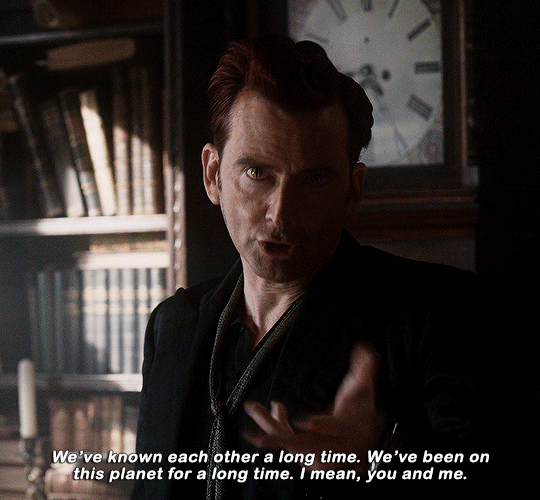
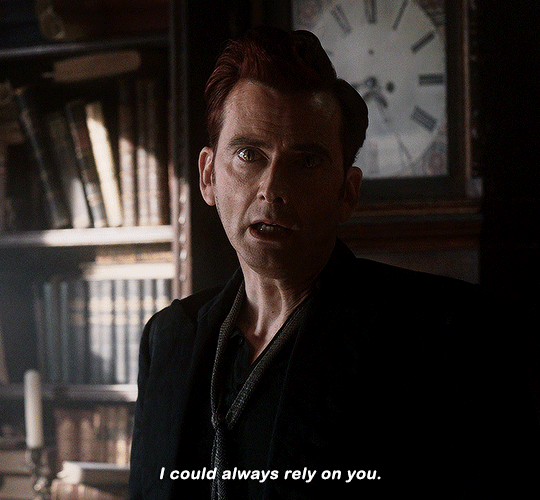
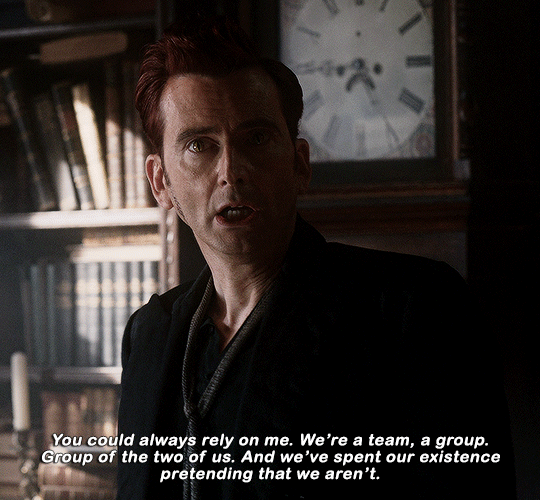
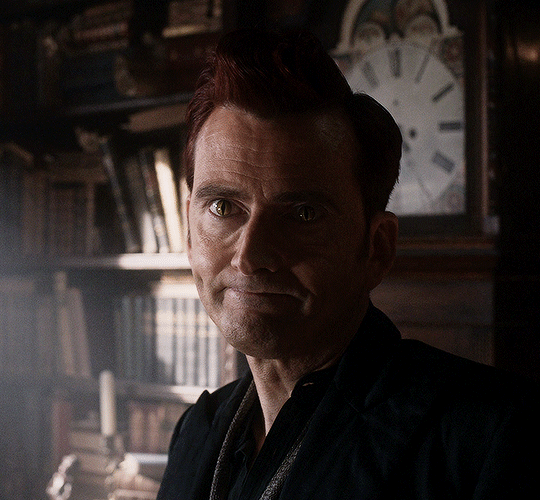
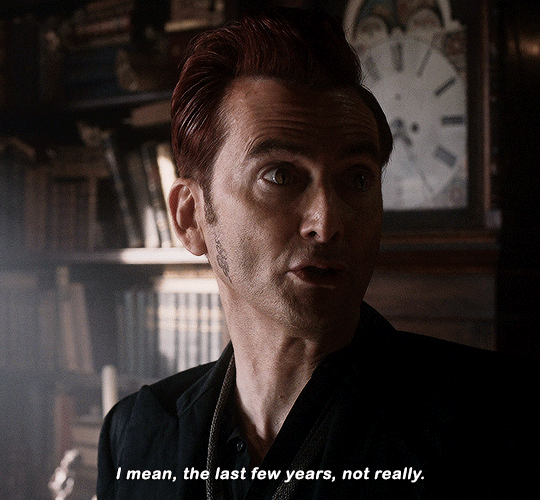
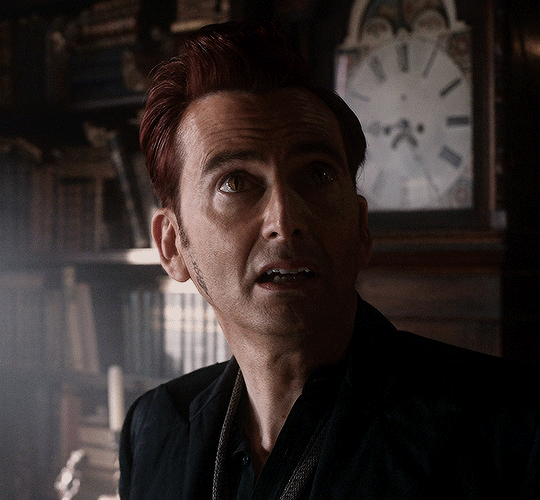
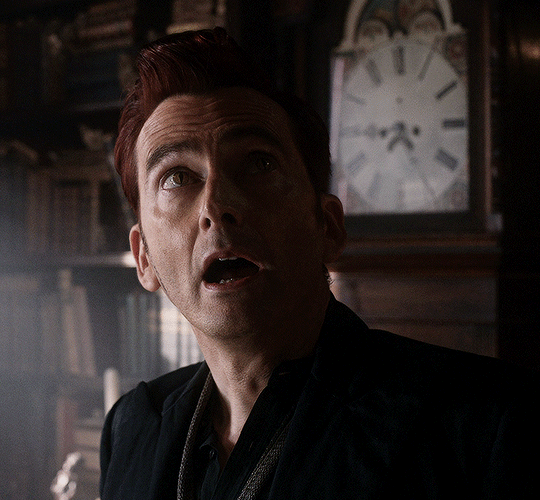
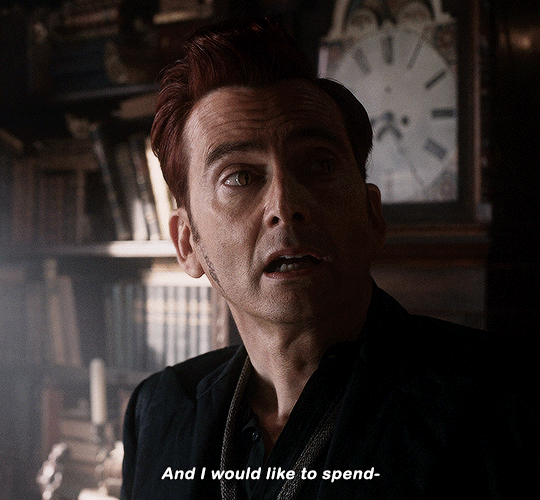

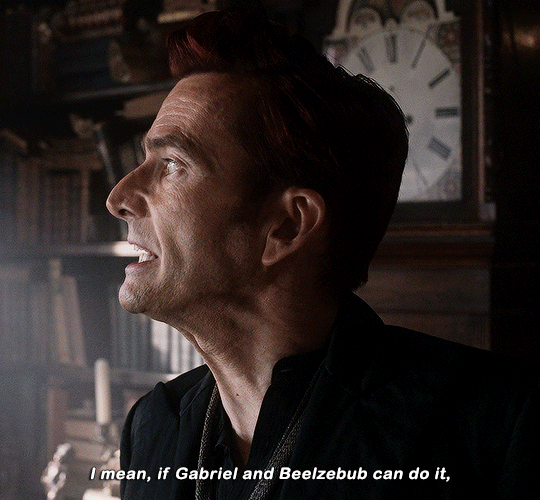

We don't need Heaven, we don't need Hell, they're toxic. We need to get away from them, just be an us. You and me, what do you say?
GOOD OMENS - 2.06 Every Day
28K notes
·
View notes
Text



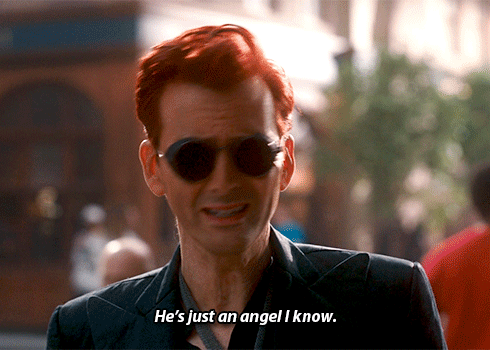
If you say so.
6K notes
·
View notes
Text
GOOD OMENS SPOILERS.
So I've been thinking a lot about Muriel. About how they're sweet and naive and sort of dumb, and they're a 37th class angel.
In fact, Muriel’s level of naivety is nearly the same as Jim-level naivety/dumbness. And Jim was supposed to be a 38th class angel, after being demoted from Supreme Archangel and having his memories removed.
And when this was revealed Muriel says 'I didn't know there was a class below me', what if Muriel is just a demoted angel? What if Heaven just keeps demoting any angel who goes against God’s (the Metatron’s) Plan and making a new, lower class for them? Instead of making them fall, they just keep taking memories and demoting angels so that there wont be a perceived ‘institutional problem’. Which there isn’t. Right?
5K notes
·
View notes
Text
Everything Is Meant (long S2 analysis, part 3)
Part one
Part two
There's SO MUCH excellent meta out there right now, and I'm going to try not to reinvent the wheel too much, but I want to keep going with tying the episodes/ elements up together because on first watch it wasn't entirely clear how everything fit. I also strongly recommend a rewatch, no matter what you felt about the ending... if you need to stop it 10 minutes early, do that, but you pick up so much more the second time around.
So: Maggie and Nina. I spent most of my first watch wondering why we were bothering with them, honestly. Later in the season Nina, and then Maggie and Nina, gave Crowley some insightful advice, but their actual relationship didn't progress despite all the meddling, and the amount of emotional investment BOTH Aziraphale and Crowley had in making them get together was frankly strange.
I started thinking in terms of mirror couples, since that was such a big deal in S1 and that's clearly what they were set up to be, but I made the mistake that all of us made on first watch: that Nina was Crowley and Maggie was Aziraphale. It still wasn't really coming together.
Then I put the psych hat back on and started to think about displacement. Displacement is a defense mechanism, and it consists of satisfying an impulse (usually an unconscious one) with a substitute object. At the beginning of the season, Aziraphale and Crowley aren't really in a good place, and I think on some level they know that. Aziraphale is trying to SHOW Crowley that he wants to take the next step through all the casual touches and phone calls and inviting him in, and feeling frustrated because Crowley doesn't seem to be taking the bait. (I absolutely think that Aziraphale tried to get Crowley to stay with him at the bookshop instead of living in his CAR, and Crowley said no. That's a whole other meta.) Meanwhile, Crowley, I think, is waiting for a Grand Gesture. Where did he go, as soon as Aziraphale brought up trying to get two humans to fall in love? Romantic tropes. Getting caught in the rain under an awning. A dramatic kiss that opens someone's eyes. That's the sort of thing he's always done, right? Big rescues, impassioned pleas on the street, fancy dinners, "give you a lift anywhere you want to go". He's defensive and guarded and unlikely to let someone in unless he's CERTAIN he won't be rejected, and Aziraphale's approaches are just too... quiet. No one's fault, they just don't speak the same language.
Then, they're handed the opportunity to make two humans fall in love, and they're both All In immediately. Look at Crowley's face when he summons the rainstorm. This is HUGE for him. Why? Because of displacement. Look at Aziraphale arranging the ball and being borderline deranged about it. They're both desperate to demonstrate what they think it takes for two people to move past their misunderstandings and fall in love. They can't do it for each other because the stakes are too high, and if either of them shows their cards unequivocally the vulnerability feels life-shattering. They're codependent and terrified of rejection and also, importantly, have no idea what they're doing when it comes to love. "Saw it in a film", Crowley says. Aziraphale's read about it in books. But they have zero practical experience.
Instead of learning to communicate, they try to say what they want to say through the medium of Maggie and Nina, up to and including the questionable moral decision to exert control over people's actions and thoughts during the ball. If I can just make this come out right, they both think, then things between us will be alright too. It HAS to come out right. They're attempting to gain some control over their own lives, over something that feels so overwhelming and shattering they can't look directly at it.
It doesn't come out right. Nina's relationship falls apart, but that doesn't mean she's in love with Maggie. While Crowley's stress-cleaning the bookshop to the music that played when Aziraphale got his books back in 1941 (just fuck me up David Arnold), they come in and tell him so. "I don't understand", says Crowley. Because it should have worked. Why didn't it work?
They tell him, of course. "You need to talk to each other. Say what you're really thinking." But here's the thing about communication: you have to learn it. You need to get the hang of expressing your feelings without blaming your partner, and separating intent from impact, and staying away from getting defensive and lashing out. No one has ever taught Aziraphale and Crowley how to do this. It's like Maggie and Nina put Crowley in front of a loom and asked him to recreate the Bayeux Tapestry. He doesn't have the skills; he's always going to get it wrong, even if he tries his hardest.
And he does try. But that's where Maggie and Nina the mirror couple, rather than Maggie and Nina the displacement relationship or Maggie and Nina the Greek chorus, come in. Aziraphale, as Nina, has just ended an incredibly toxic, invasive relationship with Heaven. A relationship that invaded every facet of his life, isolated him, and prevented him from being close to anyone else. "Rebound mess," Nina says. Aziraphale is a rebound mess. He's transferred the responsibility for his emotional wellness to Crowley. Crowley is the person he calls when he's in trouble, or (and this is key) when he wants to report a clever/ good thing he's done, or when he's bored. (At no point did Crowley reference Aziraphale calling him for a solicitous reason-- another problem.) Crowley is meant to take care of him. He forgets, I think, that Crowley is a person with his own wants and needs, just like Maggie and Nina are people with their own wants and needs who don't appreciate being messed with. (I think things would have been much different had Aziraphale BEEN THERE for Maggie and Nina's talk with Crowley, but he wasn't.)
And Maggie-as-Crowley? Lonely. Behind on rent, at risk of being evicted (it's important to note that Aziraphale saves Maggie from losing her record shop, as he couldn't save Crowley from losing his flat). Pining. Awkward. Revolving around Nina like a planet, to the extent that we don't get much of an impression of her otherwise. They realize, there at the end, that they both need to round themselves out before jumping into a relationship. Aziraphale and Crowley need that too. They need to take time apart and learn to be healthy on their own. Unfortunately they don't have the skills to get to that conclusion in a healthy way, so it all explodes in their faces and everything falls apart.
Aziraphale tries to teach Nina and Maggie to dance as a substitute for communication. Nina and Maggie try to teach Crowley communication as a substitute for the dance they've been doing around each other. That's the reason they're a part of the plot: they exist to demonstrate the way Aziraphale and Crowley might have succeeded in forging a better dynamic. Sadly, the boys' dance is too practiced and they got sucked right back into it.
It's okay, I think, that Nina and Maggie's storyline never really went anywhere. It wasn't supposed to. It's an allegory, not something that needs to stand alone.
2K notes
·
View notes
Text
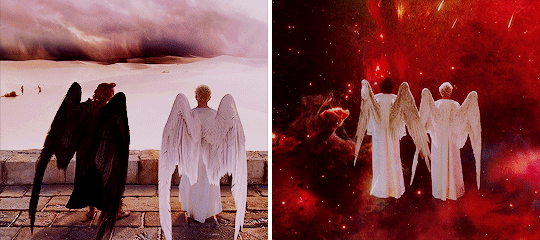
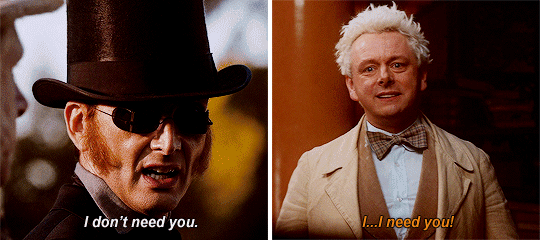
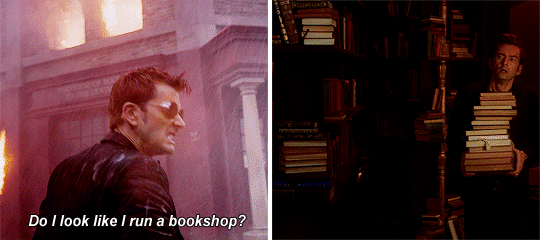

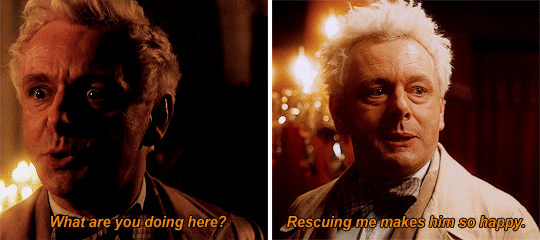
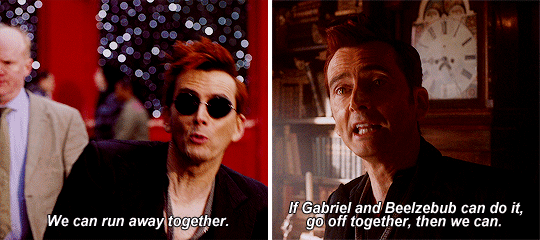

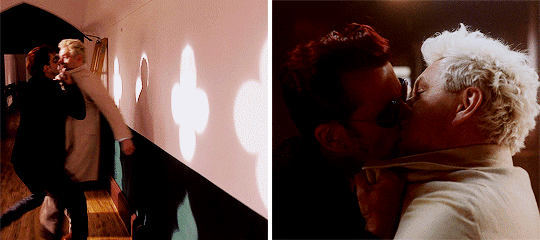
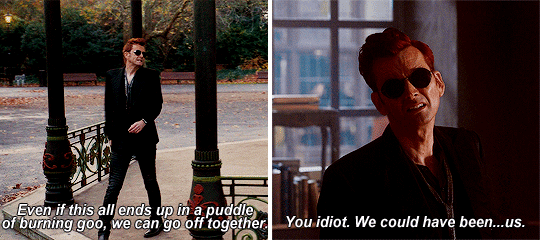
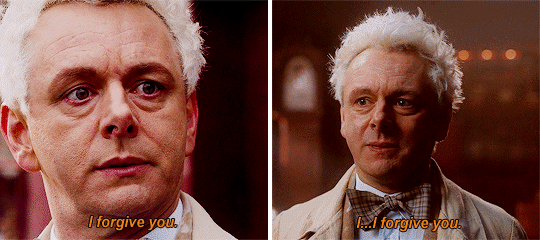
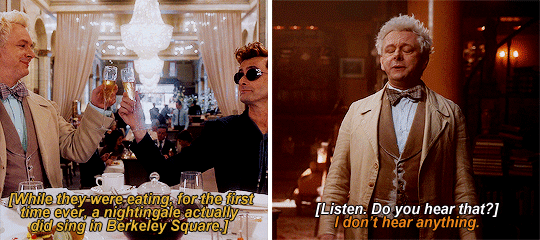
Aziraphale & Crowley + parallels
26K notes
·
View notes
Text
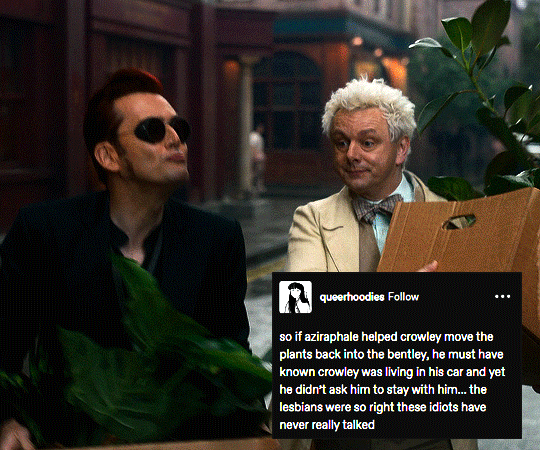

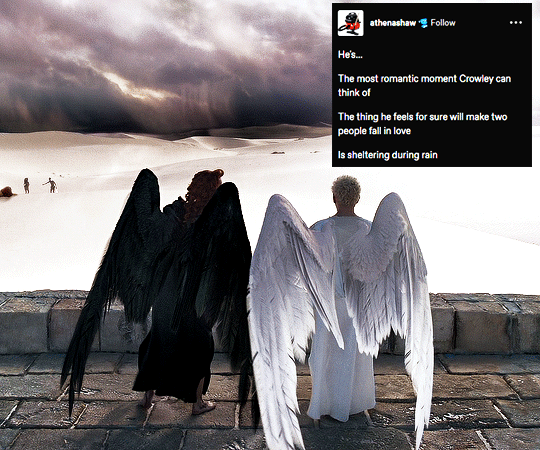
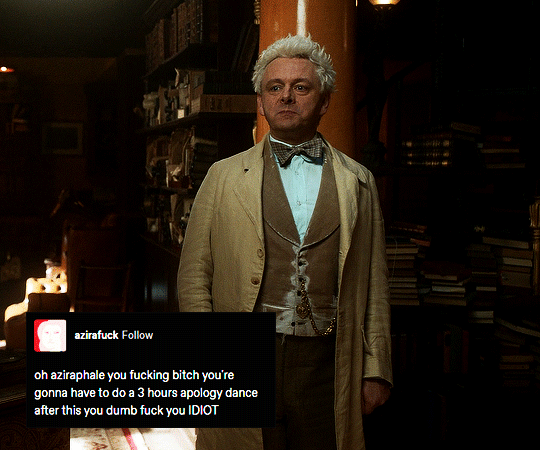

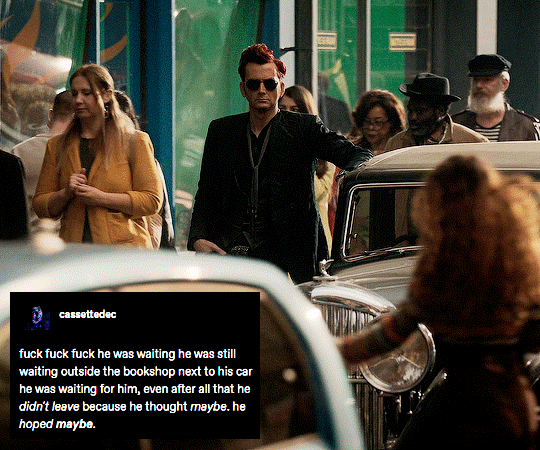

AZIRAPHALE & CROWLEY + text posts
33K notes
·
View notes
Text

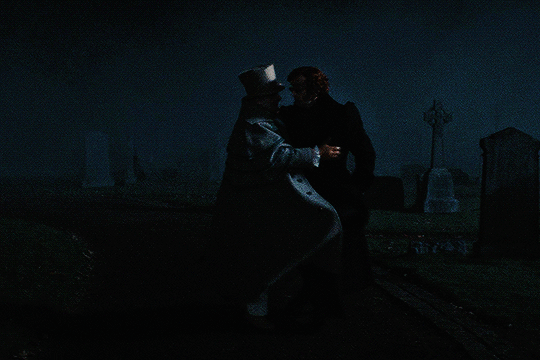
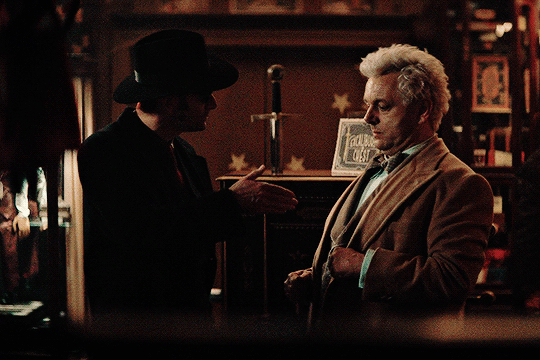
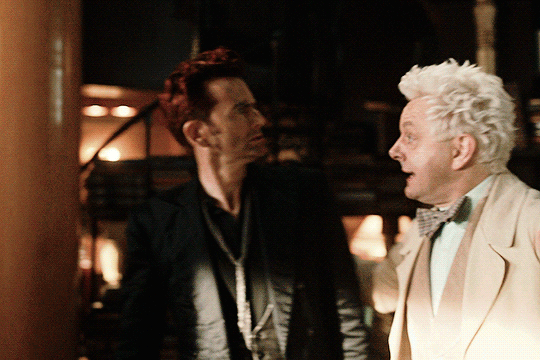
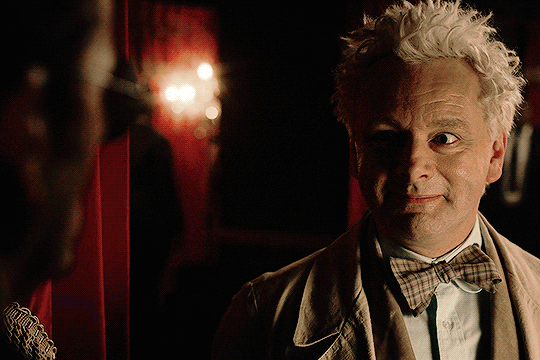

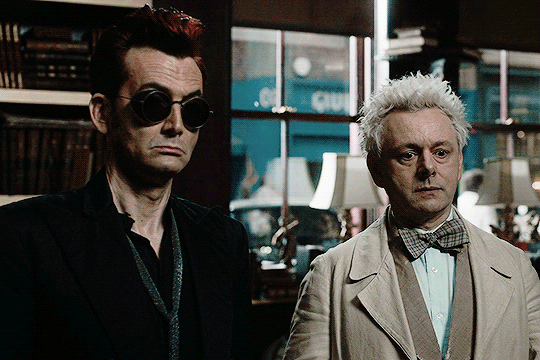
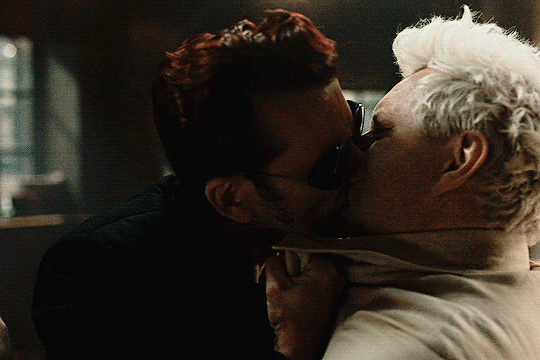
Aziraphale and Crowley in S2 + touch
9K notes
·
View notes
Text
Everything Is Meant (long S2 analysis, part 2)
Part one here
Okay, so that's how I think the pre-creation scene and Gabriel's arc connect to Aziraphale's choice. I also think the ineffable bureaucracy speedrun exists to prove totally different things to Aziraphale and Crowley: Aziraphale loves that they can love each other but notes they have to run away to be together; Crowley sees this and immediately thinks "hey, we can do that too!", forgetting that running away is not a solution Aziraphale has ever been interested in. It's the mentality of an individualist vs a group-oriented mind, and neither of them is necessarily wrong, it's just that their priorities are different and they HAVE TO TALK ABOUT IT, which they don't.
Continued analysis under the cut:
3. Let's take the Job minisode. Why include it? We already mentioned that it proves Aziraphale remembers Crowley as an angel, since he mentions it. And he believes Crowley is the same person he always was, and that he doesn't want to harm Job's crops or animals or children. Crowley tries to convince him he's a Big Bad Demon who is all in on this assignment, but fails utterly to kill even a single goat, soooo... Aziraphale comes to the conclusion that he knows what Crowley wants. Alert! Alert! This is a big problem! Crowley says, "What do you know about what I want?" Aziraphale: "I know you." Crowley: "You do not know me." But because Aziraphale got it right this time, he goes ahead assuming he'll always get it right, which is a crucial failure when it comes to the final reckoning. He doesn't ever ASK Crowley what he wants, he just assumes. When you assume you know what someone wants, you usually assume their priorities align with yours... he couldn't be more wrong about that. The Job minisode sets up this dynamic for them, and they never really manage to change it.
The other thing happens at the end of the minisode. Crowley acknowledges two crucial points: 1) he's lonely ("But you said it wasn't!" "I'm a demon. I lied"), 2) he doesn't think Aziraphale would like Hell. Aziraphale DOESN'T like Hell. Aziraphale hates Hell for what they've done to Crowley. He doesn't see Heaven as innocent or benign, but importantly, Heaven has never tried to hurt Crowley directly. They never threatened his safety. They never tortured him (as it's heavily implied that Hell did). Fast forward to the last ten mins of season 2: Aziraphale excited to tell Crowley that he can be an angel again BECAUSE: he never has to go back to Hell. They can never hurt him again, not the way they did before. And he doesn't have to be lonely anymore.
Last point before I leave Job: Crowley has the chance to cause Aziraphale to Fall, here, probably. ("I lied to Heaven to thwart the will of God!" "You did, but I'm not going to tell anybody. Are you? ...good, then nothing has to change.") He doesn't take it. He doesn't want Aziraphale to be a demon. He loves Aziraphale as he is. "Angel" as an affectionate. Aziraphale certainly doesn't use "demon" as a pet name for Crowley. I think they set up this scene to contrast the final one, and show how deeply hurt Crowley is that Aziraphale suggest he change.
4. Moving on to Victorian Scotland. This one confused me at first. I was delighted that they brought back the "the lower you start the more opportunity you have to rise" dialogue from the book, but apart from that I didn't really see the point of it. It seems like the statue of Gabriel and the fact that he and Beelz ended up at that pub in the present were more or less coincidental.
The point, I think, is actually not the girl, but the doctor. He's a person who is trying to do good by working in a system that's deeply flawed, and engaging in questionable moral practices for the greater good. (Cadaver dissection is still an essential part of medical school. You need dead bodies to understand living ones.) He shows Aziraphale a tumor he removed from a child who died, and Aziraphale clutches it to his chest. The camera zooms in and lingers to tell us that this is a guardian through and through. He wants to protect people. He wants to do good with every fiber of his being.
To Crowley, it's enough to just "be an us" with Aziraphale. He doesn't really want anything more than that. That's an issue! For one thing, it fosters unhealthy codependency, and for another, Aziraphale would never be happy without the opportunity to help and protect people. It's an essential part of who he is. Metatron knows that, and he plays Aziraphale like a fiddle. The doctor showed Aziraphale that you can make a difference even in systems that are flawed, and even if you have to do things you'd rather not do. Aziraphale doesn't want to go back to Heaven, but he truly thinks he can change things; thinks he can be a guardian with some real power. In his mind, that's the right thing to do.
Last thing that happens in Scotland: Crowley saves a soul from Hell, arguably, by preventing a suicide. He gets in Big Trouble. Whatever happened to him downstairs resulted in him coming back up, leaning on a cane, and asking Aziraphale to give him holy water. Go back and watch that scene knowing what we know now about the Victorian minisode. Ask yourself how Aziraphale must have felt. He likely blamed himself for what happened, because if he hadn't meddled then they never would have been there in the first place. He knew where Crowley was, and why he was there, and he had to sit with that knowledge for years. He desperately wants Crowley to be safe; is perfectly willing to push him away to keep him safe-- which is what he does do, the minute Crowley gets back.
Now think again about what Metatron offered him. A chance to keep Crowley safe forever. He'd never be harmed again. Aziraphale is going to take that offer, no matter what else is asked of him. He's shown over and over again that he'll sacrifice his own happiness to make sure nothing happens to Crowley. And he'll do it without talking to Crowley about it first, because he is a moron who doesn't know how to use his words. Leading Crowley to assume that Aziraphale doesn't love him. The idiot angel is doing it all out of love, but because he doesn't make himself clear Crowley doesn't know that.
Part 3: Maggie and Nina, and their roles as mirror couple/ Greek chorus!
2K notes
·
View notes
Text
Everything Is Meant (long S2 analysis, part 1)
I cannot figure out for the life of me how to make gifs so this will have to be a gif-less essay. If anyone more tech savvy than me wants to reblog with relevant media, please do!
I've seen a lot of people saying how Aziraphale's actions in the final ten minutes come out of left field and are OOC, and when I first watched the episode I felt the same, but now I think I couldn't have been more wrong. And I don't think Aziraphale is being controlled... I think the entire season showed us exactly what was going to happen.
On first watch, what struck me was the number of plot points that seemed disconnected. I couldn't figure out how Job related to the present, or the Victorian era, or the Nazi zombies (still at sea on the zombies part tbh). I didn't know where the Maggie/ Nina subplot was going, or why we were bothering with it. Then I put my "psych hat" on and it was like seeing one of those 3D pictures come into focus. It's a psychological networking rather than a plot-driven one, which is what Neil told us to expect.
Detailed analysis under the cut, with spoilers:
I went back through the season in my head and started asking myself: why is this element there? What does it contribute?
1. Start with scene one. Why include it? Does it matter for the climax that Az knew Crowley as an angel? YES. It's actually huge. Angel Crowley was joyful, he was bursting with delight at creation, he was idealistic. He wanted to be a part of everything rather than run away from it, and that's still how Aziraphale feels. He loves being a part of things. He's a joiner. He's a landlord. He dances at clubs and he makes human friends and he learns magic. Crowley the demon doesn't seem to want any of that, and I think that's hard for Az. He wants Crowley to be free of the cynicism he thinks prevents him from enjoying life now. At some level, I think he senses that Crowley is depressed (empathy's not his strong suit but I'm sure he's aware that Crowley's in a "what's the point of it all" kind of mood; see the eccles cakes scene). He wants to fix it. Aziraphale is a fixer. Metatron offers him a chance to do that.
Another thing is that Aziraphale knows Crowley ended up Falling just for asking questions that seemed innocent. That's not okay with him. He thinks that with the two of them in charge they can actually MAKE the changes that Crowley wanted to see way back at the beginning, starting with a suggestion box.
2. Okay, now Jim. Obviously Gabriel/ Jim is the central mystery, but why does he matter? First and foremost: he's there to show Aziraphale that angels can CHANGE. Gabriel terrorized and threatened Aziraphale. Az has been terrified of him. He ordered Aziraphale's execution. And now here he is, drinking hot chocolate, doing noble self-sacrificing things, with morals that suddenly align with Aziraphale's. What an absolute game-changer that must have been! He thought Heaven was unfixable, but here's Gabriel in his shop for weeks, slowly convincing him otherwise.
Then two other things happen. First, they find out that this all happened to Gabriel essentially because he fell in love. He was fired and his memories were stolen and the only reason he recovered was because Beelzebub happened to give him the one thing that could save him. That must have seemed like incredible luck. Now, how does Aziraphale feel about memories? He lives in a bookshop that is stuffed to bursting with the records of all of human history, essentially. His memories of his time with Crowley are incredibly precious. He sees, there at the end, that everything he is can be taken from him as a punishment for falling in love. Aziraphale doesn't have a magic fly container. He'd be forever robbed of Crowley, his life, himself. It's a very real threat in his mind when Metatron intervenes.
Which brings us to the second thing. Metatron saves Gabriel. Not only that, he prevents him from being punished for loving Beelzebub and lets them both go. What better way to win currency with Aziraphale? HE doesn't want to go off to Alpha Centauri, he never has, but suddenly he sees that Metatron might protect his relationship. And he's probably the only entity with the power to do so.
So we come to two conclusions: Aziraphale, when he goes off to talk with Metatron, is feeling like maybe it's not intrinsically bad to be an angel. He believed all the angels sucked, and only God was good... but now he sees that even Gabriel can change. He met Muriel, and he likes them. (He also had a huge crush on angel Crowley, which is neither here nor there but he loves Crowley in all his forms.) So if Crowley became an angel again, would that really be so bad? In his mind, it wouldn't change who Crowley is. It would just make them both safer and allow them to be together. (He's wrong! And Crowley doesn't see it that way! But this is a key miscommunication. Aziraphale doesn't really believe that becoming a demon changed Crowley. Back to the first scene, which Aziraphale references during the Job minisode. In his eyes, Crowley is the same person (just more cynical because of what's happened to him)-- so why would it matter if he's an angel again? I truly don't think he was trying to save Crowley, or saying that Crowley would be Better as an angel. To him, it doesn't matter what Crowley is. Which is reductive and harmful, but not the same as thinking Crowley needs rescuing from himself.)
Second conclusion: he sees that an angel and demon can be in love, but they have to run away to be together. Gabe and Beelz couldn't go home again. Earth is Aziraphale's home, but after the attack on the bookshop he learned that without Heaven's protection he can't really keep them safe there. Metatron says: "Come with me, do this thing, and you can have guaranteed safety AND be with the love of your life". Poor Aziraphale wants this with every fiber of his being. All he's ever wanted was for Crowley to be safe. He's never been able to offer it. Over the past four years, he thought they were safe, but he's just learned that he was wrong.
This is getting long. Continued in Part Two!
2K notes
·
View notes
Text











Crowley's POV
Based on an excellent analysis (pt. 1, pt. 2) by @twilightcitysky, other analyses I've read on tumblr and my own analysis
Aziraphale's POV
5K notes
·
View notes
Text

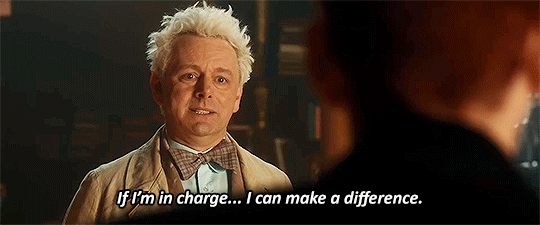

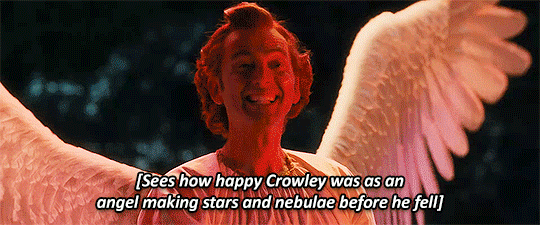



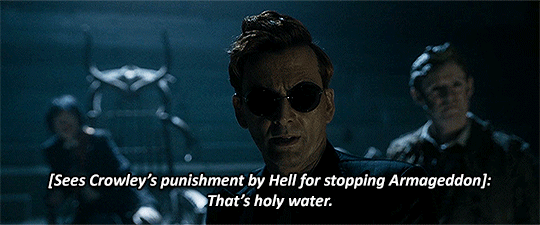


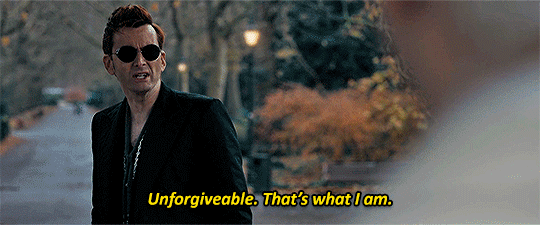
Aziraphale's POV
Based on an excellent analysis (pt. 1, pt. 2) by @twilightcitysky!
Crowley’s POV
5K notes
·
View notes
Text
The thing that still gets me about that final scene is that both Aziraphale and Crowley actually admitted for the first time that they wanted to be together like ‘that’. They didn’t say it in a direct way but it was implied through the language they used.
Crowley was the initiator, and I think people misinterpreted Aziraphales actions as a rejection of ‘them’ when it wasn’t.
‘Together’ meant the same thing to both of them in this conversation because Crowley defined it by using Beelzebub and Gabriel as an example of together. So what together meant was established, and Aziraphale reciprocated Crowleys feelings. He literally said ‘We can be together.’
The problem is that they differ on how they want to be together.
Aziraphale sees the Metatrons offer as the perfect opportunity-they can be on the same side and the ‘issue’ of them being a rouge angel and demon is removed. They can be together peacefully (he believes). He wants them to work together with their collective power and strengths to make the institution of Heaven better. He is still stuck in some of his black and white thinking, but his intention is good.
But Crowley sees him and Aziraphale as a team against the world, Heaven and Hell. Their relationship has become a safe, secure place for him where he feels accepted. He doesn’t care about angels/demons/politics and all that ‘pointless’ stuff. He doesn’t want to be a part of the institution. He doesn’t believe it’s fixable. He doesn’t believe they would ever be treated fairly. He doesn’t want to shift the relationship. He wants him and Aziraphale to be their own team removed from all the things he believes will corrupt the relationship and push them apart.
The intention of both of them in this conversation is preservation. They each think that what they want is what will preserve the relationship and they fundamentally disagree with the others perspective.
It’s just so fucking sad because they’re both standing there telling each other that they want to be together. They’re trying to bring the other one to where they think they will be safe together and I’m…
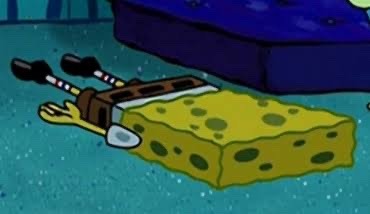
79 notes
·
View notes
Text
I found my new ship
And they broke my heart
4 notes
·
View notes
Text
So I've started writing drabbles of Act II of Open Your Eyes, and man.... Ra's Al Ghul is so fucking evil and conniving, and I'm here for it.
18 notes
·
View notes